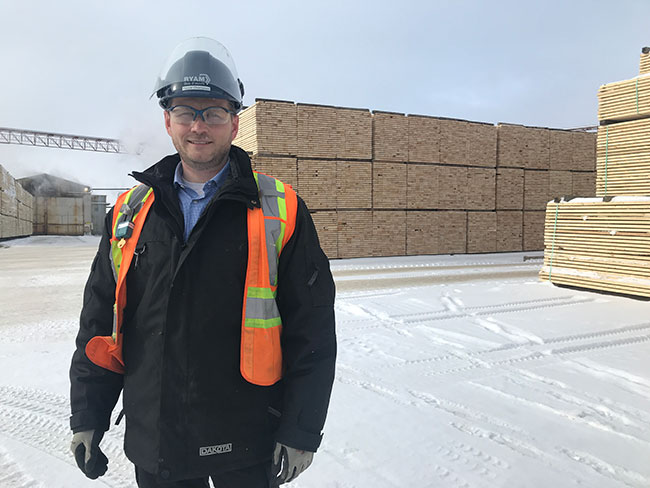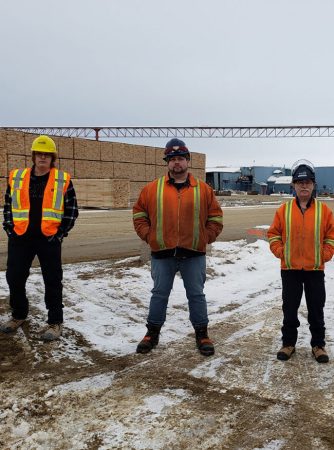
Features
Mills
Sawmilling
Dedicated design: Quebec sawmill invests millions to modernize operations
August 11, 2021 By Émélie Rivard-Boudreau Translated by Peter Diekmeyer
 ABOVE: Pascal Champoux is the general manager of the Béarn plant. Photos courtesy Émélie Rivard-Boudreau.
ABOVE: Pascal Champoux is the general manager of the Béarn plant. Photos courtesy Émélie Rivard-Boudreau. Patrick Trudel arrives at work at 6:15 am. The production superintendent at Rayonier Advanced Materials (RYAM)’s Béarn, Que., sawmill – recently acquired by GreenFirst Forest Products – starts his day by checking production data for the past 24 hours and making sure that everything is in place so operations are fired up by 7:00 a.m.
“I do a health and safety tour and check if everyone is there,” Trudel says. “I try to talk to the operators every day to see how they are.”
Trudel “traded his tie for steel-toed boots” two-and-a-half years ago after working a decade in finance to return to his first love: forestry.
“When I get up in the morning I want to come to work,” he says energetically. “I liken it to playing hockey. We apply different strategies depending on the situation, we have different indicators to assess how we are performing, and each day our goal is to perform a little bit better.”
Béarn’s “managers” have provided Trudel with some decent tools. The list of machinery acquired or improved thanks to the $7 million RYAM has invested since 2018 is long. It includes a new MEC dry kiln, Comact chipper-canters, and Autolog carriage optimizers and control systems. In the planer mill, Béarn chose Autolog for its new ProGrader linear optimizer and inkjet printer, Smart Mill for its loader with MSR function and Carbotech for its grader.
These choices were made in conjunction with RYAM’s corporate engineering department, notes Pascal Champoux, the plant’s general manager.
“We rely on their experience and expertise,” says Champoux. “They set up installations in some of the company’s other factories, so we saw what works. This helped us to make our supplier choices.”
Productivity and quality
The modernization had a direct effect on productivity. But, it also helped minimize inconveniences.
“We had numerous jam-ups at the exit points of our debarkers,” Trudel says. “But, changing the scanning process to enable better log distribution was a real plus. Today, we very rarely have to do any unblocking.”
This avoids huge time losses, says Trudel, who happily produces statistics to prove it.
“Shifts of 300,000 board feet and over were rare in the past,” he says. “Today, as we are speaking in January 2021, we are on track to reach that level for the 20th time in the past 30 shifts. Efficiency has increased considerably.”
The addition of a third kiln now enables the mill to dry all of its wood.
“Our two kilns were not able to handle all of our production,” Champoux says. “We had to let the wood dry outside in the fresh air before putting it in the kiln. The new investments enable us to process all of our output right away instead of letting it accumulate in the backyard. Well-dried wood also makes planing easier.”
The money invested in the planer mill made it possible to improve quality, and thus to produce more value-added wood.
“We used to operate particularly old machinery!” says Trudel. “It was incredible. It weighed tons, the wood was jamming up. The new technology enables us to certify our parts and to make better quality wood that has strength and resistance properties. This means we can sell it at a much better price.”

Three generations of the Chalifoux family work at the Béarn sawmill: Alex, Philias and Jacques (from left to right).
An effective team
With all this new machinery, it made sense to also have effective operators. Indeed, the plant is filled with posters that suggest possible stretching and warm-up routines that operators can do.
“We try to be innovative,” Champoux says. “Being loose helps reduce the number of incidents. Staring in 2020, employees began taking a few minutes to do various exercises – based on their job descriptions – prior to each shift.”
The company employs 150 people at its Béarn plant. They work Monday through Thursday on 10-hour shifts, either during the day or at night. However, the dryers are only operating from Friday to Sunday.
“Workers appreciate the four-day week,” Champoux says. “It helps us recruit and maintain employees. In 2020, two of our people celebrated their 45th year of service at the plant. During the celebration, one of them had his son and his grandson at his side, as both were also employees at the factory.”
The Béarn sawmill has had to be original to attract new talent following the retirement of several employees. The company held an open house in 2019, and then organized a recruitment tour in Témiscamingue, Que., and in Ontario at the end of 2020. They brought along a trailer truck loaded with wood that was produced at the plant to impress onlookers.
“It was a great success,” Champoux says. “We received about 20 or 30 CVs that day and continued to get more after that. It enabled us to fill many vacant positions.”
But, one big priority still is gender diversity. While there are fewer women in forestry on average, the company’s management remains committed to improving that balance.
More coming soon
The Béarn facility still has many projects on its to-do list. For example, this year, RYAM plans to invest $900,000 to replace an edger optimizer and control system in its sawing department.
In 2022 the bull edger in the plant’s 16-foot sawing line is expected to be replaced. The scale of the work will be colossal. The project will cost an estimated $6.7 million, and operations will need to be shuttered temporarily.
“We are still evaluating exactly how long we’d be closed,” Champoux says. “It could take several weeks.”
The Béarn team is also working to recover and add value to wood offcuts which, in the past, would be shredded into chips.
“For example, if we are producing 2×4 planks that are eight feet long and one end of the part is not good, we can try to make a 2×4 that is five feet long,” Trudel says, noting that the company is currently lining up buyers for such non-standard products. “It takes a long time to grow a tree. So, when we cut it down, we want to optimize its value.”
The Béarn sawmill at a glance
- Annual production: 100 million board feet per year
- Facilities: two sawing lines (eight feet and 16 feet), a planer mill and three kilns
- Fibre supply: forests in Témiscamingue and southern Abitibi
- Market: Canada and the United States (30 to 40 per cent)
No more fuel oil!
A biomass kettle was installed on the site of the Béarn plant in 2012. It produces steam for the three kilns
Print this page